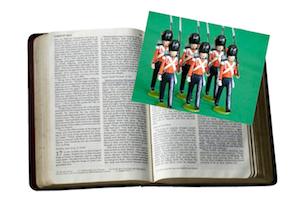 As part of my work at Herald of Truth, I do a 15-minute program, Monday through Friday, called “Lea La Biblia” (Read the Bible).
As part of my work at Herald of Truth, I do a 15-minute program, Monday through Friday, called “Lea La Biblia” (Read the Bible).
The program itself is divided into segments. During the first part of the program, I do a 3-4 minute segment on Bible study, offering up tips on how to study the Bible. (And I’m always looking for suggestions on that! Feel free to chime in with tips you think would be useful)
One of my favorite subjects is the subject of context. I like to mention that the word context comes from Latin words basically meaning “with knitting.” I like the idea of the Bible as a knitted garment, made up of many threads that are all brought together as one.
Years ago, I sold clothing in a men’s clothing store. One day, I was delivering a pant to a customer when I noticed that there was a thread sticking out. Being a helpful clerk, I started to trim the thread. From across the store, one of the longtime employees yelled, “NO! You’ll ruin the pants.” She knew that cutting that thread would cause it to continue unraveling.
To me, pulling a passage out of context is a bit like that. One thread doesn’t tell you what a finished sweater looks like. Pulled out of the sweater, it’s just a bit of trash, and the sweater is damaged.
I also use the example of a note of music. One note doesn’t tell you what the symphony sounds like.
When I preach and teach, I try to use as long a passage as possible. There are times when I teach topically and quickly refer to a verse here or there, but I try to stay away from that. We need to learn to study the Bible in context.
The old saying goes, “A text without a context is a proof text for a pretext.” (I’ve also heard “pretext for a proof text,” but this way makes more sense to me) When it comes to Bible study, context is king.
Can you think of examples of passages that are often lifted from their context?



